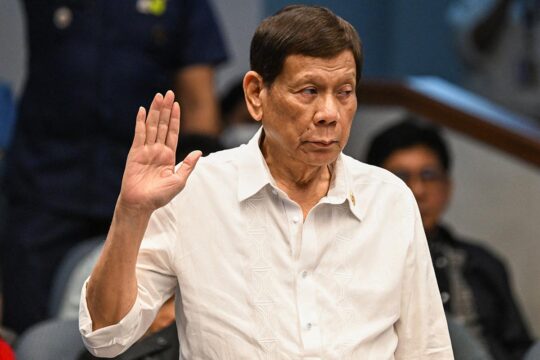Wikileaks founder Julian Assange will on Tuesday make his first public address since his release from a British prison, speaking about his detention at the Council of Europe rights body.
Assange will be at a hearing in Strasbourg from 0630 GMT at the Parliamentary Assembly of the Council of Europe (PACE) which issued a report expressing alarm at the whistleblower's treatment.
The hearing would explore the 53-year-old Australian's "detention and conviction and their chilling effect on human rights," PACE said.
Assange spent most of the last 14 years either holed up in the Ecuadoran embassy in London to avoid arrest, or locked up at Belmarsh Prison.
He was released from prison in June, after serving a sentence for publishing hundreds of thousands of confidential US government documents.
The trove included searingly frank US State Department descriptions of foreign leaders, accounts of extrajudicial killings and intelligence gathering against allies.
Assange returned to Australia and since then has not publicly commented on his legal woes or his years behind bars.
He has been seen infrequently, appearing at a court in the Marianas Islands, reuniting with his wife on arrival at a Canberra airport and spending time with his family on a beach in Australia.
Although Assange was "still in recovery" from his extended confinement, Wikileaks said Wednesday he would attend the "exceptional" hearing organised by the Council's Committee on Legal Affairs and Human Rights.
A report into Assange's case by one committee member, Icelandic lawmaker Thorhildur Sunna AEvarsdottir, is the basis for a draft Council of Europe resolution calling on the United States, member state, "to investigate the alleged war crimes and human rights violations disclosed by him and Wikileaks", the body said.
Wikileaks said the report "focuses on the implications of (Assange's) detention and its broader effects on human rights, in particular freedom of journalism" and "confirms that Assange qualifies as a political prisoner".
- Forthright or restrained? -
Assange's timing and his choice of venue have puzzled some observers.
The Council of Europe brings together the 46 signatory states of the European Convention on Human Rights, with little say over Assange's legal fate.
He is still campaigning for a US presidential pardon for his conviction under the Espionage Act.
Some legal experts believe Assange's appearance could put that bid at risk.
"He'll inevitably be critical of the US government on some level and I can't see that as something that is going to be considered helpful," Holly Cullen, a law professor at the University of Western Australia, told AFP.
"Even if he personally thinks that he doesn't care, his legal advisers would say 'maybe you need to be a bit more restrained until the pardon issue is resolved'."
Chelsea Manning, the army intelligence analyst who leaked the documents to Assange, had her 35-year sentence commuted by President Barack Obama in 2017.
But Assange's case remains deeply contentious.
Supporters hail him as a champion of free speech and say he was persecuted by authorities and unfairly imprisoned. Detractors see him as a reckless blogger whose uncensored publication of ultra-sensitive documents put lives at risk and jeopardised US security.
President Joe Biden, who is likely to issue some pardons before leaving office next January, has previously described Assange as a "terrorist".


